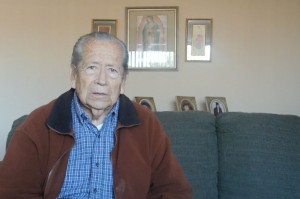Language barriers still stop many Latinos from seeking better jobs and U.S citizenship
|
EL PASO — When Juan García Aleman, an 87-year-old retired shoemaker who worked for the boot-making Tony Lama Company for 20 years moved here from Juarez in the 1950’s he didn’t need to speak or read English in the workplace. Jesus Saucedo, a 29-year-old who was born in California but went to Mexico with his parents at age three, now lives here and struggles as a community college student with limited knowledge of English. He says he has difficulty communicating effectively at his fast-food job and is hesitant to pursue a leadership position. Their personal stories, different in many ways, are connected because of the language barriers they faced as residents of a border city that is predominately Hispanic and bilingual. For example, U.S. Census statistics from 2010 show that 75 percent of El Pasoans speak Spanish at home, and only 24 percent of the city’s 700,000 resident are monolingual speakers of English.
